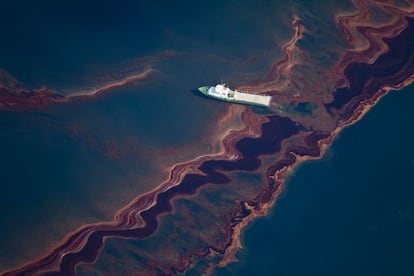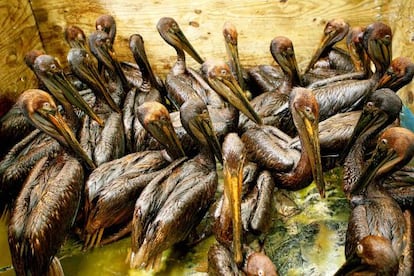Mexican fishermen file US lawsuit against BP for Gulf oil spill damages
Five years after the ecological disaster, Mexico has not received any compensation

It’s been five years since a gigantic oil spill in the Gulf of Mexico – caused by an accident on a British Petroleum (BP) deep-sea exploration rig – caused multi-million losses to businesses and an incalculable amount of ecological damage.
While the US government ordered BP to pay compensation to Washington and the gulf states of Alabama, Florida, Louisiana, Mississippi and Texas, Mexican fishermen, whose livelihoods have also been affected, are yet to see a single penny from the energy giant.
The compensation cannot be restricted to just US territory, it should have been extended to the entire Gulf of Mexico”
But now they may get their say in a US federal courtroom. Some 25,000 Mexican fishermen from three coastal states of Tamaulipas, Veracruz and Quintana Roo are seeking compensatory and punitive damages in a civil lawsuit.
It marks the first class action to be brought by a group of non-US citizens against BP for the oil disaster, which began on April 20, 2010 at the Macondo well, where the company was operating a deep horizon exploratory rig.
Some five million barrels of crude spilled into the Gulf between April and September of that year, making it one of the worst ecological disasters the US has ever seen.
On its website, BP says it has paid out more than $1.805 billion in compensation to US fishermen, but none of that money has gone to their Mexican counterparts.

In the wake of the disaster, the Mexican government of then-President Felipe Calderón rejected taking legal action against BP, and also ruled out joining any lawsuit filed by Mexican fishermen.
But the ecological impact on the Mexican coastline has been huge and can still be felt today: thousands of species have been affected, the waters are still contaminated, and in some places there is irreparable damage, the fishermen allege.
“The compensation cannot be restricted to just US territory, it should have been extended to the entire Gulf of Mexico,” explains Horacio Polanco, legal representative for the fishermen, in a telephone interview. “There are at least 30 types of migratory species that we share with the United States, and the damage has been enormous.”
Among the plaintiffs are companies, fishermen’s collectives and individual mariners who go out daily to help feed their families.
“To say that damages only occurred in the United States is a lie and shows a lack of respect for Mexico,” Polanco said.
Workers from Tabasco and Campeche states, where the majority are employed in the oil exploration industry, have decided not to join the suit.
In a letter signed by 62 representatives of fishermen, and which is included in both the US lawsuit and another filed in Mexico, the workers urge the Peña Nieto government to comply with its pledges to protect the environment.
Polanco believes that the government is trying to avoid bad blood with BP now that Peña Nieto is looking for foreign investors, after opening up Mexico’s petroleum industry to outside contracts.
In 2012, Petróleos Mexicanos (Pemex) signed an agreement with BP to work together on joint deep sea exploration operations in Mexican waters.
Tu suscripción se está usando en otro dispositivo
¿Quieres añadir otro usuario a tu suscripción?
Si continúas leyendo en este dispositivo, no se podrá leer en el otro.
FlechaTu suscripción se está usando en otro dispositivo y solo puedes acceder a EL PAÍS desde un dispositivo a la vez.
Si quieres compartir tu cuenta, cambia tu suscripción a la modalidad Premium, así podrás añadir otro usuario. Cada uno accederá con su propia cuenta de email, lo que os permitirá personalizar vuestra experiencia en EL PAÍS.
¿Tienes una suscripción de empresa? Accede aquí para contratar más cuentas.
En el caso de no saber quién está usando tu cuenta, te recomendamos cambiar tu contraseña aquí.
Si decides continuar compartiendo tu cuenta, este mensaje se mostrará en tu dispositivo y en el de la otra persona que está usando tu cuenta de forma indefinida, afectando a tu experiencia de lectura. Puedes consultar aquí los términos y condiciones de la suscripción digital.








































